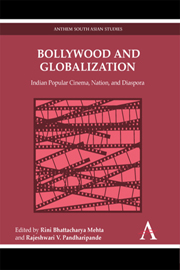Book contents
- Frontmatter
- Contents
- Acknowledgements
- Notes on Contributors
- Chapter One Bollywood, Nation, Globalization: An Incomplete Introduction
- Chapter Two Sentimental Symptoms: The Films of Karan Johar and Bombay Cinema
- Chapter Three Is Everybody Saying ‘Shava Shava’ to Bollywood Bhangra?
- Chapter Four Bollywood Babes: Body and Female Desire in the Bombay Films Since the Nineties and Darr, Mohra and Aitraaz: A Tropic Discourse
- Chapter Five Globalization and the Cultural Imaginary: Constructions of Subjectivity, Freedom & Enjoyment in Popular Indian Cinema
- Chapter Six Rang De Basanti: The Solvent Brown and Other Imperial Colors
- Chapter Seven Between Yaars: The Queering of Dosti in Contemporary Bollywood Films
- Chapter Eight Imagined Subjects: Law, Gender and Citizenship in Indian Cinema
- Chapter Nine ‘It's All About Loving Your Parents’: Liberalization, Hindutva and Bollywood's New Fathers
- Notes
- Select Bibliography
Chapter Three - Is Everybody Saying ‘Shava Shava’ to Bollywood Bhangra?
Published online by Cambridge University Press: 05 March 2012
- Frontmatter
- Contents
- Acknowledgements
- Notes on Contributors
- Chapter One Bollywood, Nation, Globalization: An Incomplete Introduction
- Chapter Two Sentimental Symptoms: The Films of Karan Johar and Bombay Cinema
- Chapter Three Is Everybody Saying ‘Shava Shava’ to Bollywood Bhangra?
- Chapter Four Bollywood Babes: Body and Female Desire in the Bombay Films Since the Nineties and Darr, Mohra and Aitraaz: A Tropic Discourse
- Chapter Five Globalization and the Cultural Imaginary: Constructions of Subjectivity, Freedom & Enjoyment in Popular Indian Cinema
- Chapter Six Rang De Basanti: The Solvent Brown and Other Imperial Colors
- Chapter Seven Between Yaars: The Queering of Dosti in Contemporary Bollywood Films
- Chapter Eight Imagined Subjects: Law, Gender and Citizenship in Indian Cinema
- Chapter Nine ‘It's All About Loving Your Parents’: Liberalization, Hindutva and Bollywood's New Fathers
- Notes
- Select Bibliography
Summary
Theorizing Indian Cinema as a national cinema, film studies have focused on the relationship between popular Hindi films and the Indian nation. Sumita Chakravarty's National Identity in Indian Popular Cinema: 1947–87 set the trend for a number of texts that viewed Indian popular cinema as a cultural system through which the new nation was imagined. Readings of popular Hindi films by scholars such as Ashish Rajadhyaksha, Madhava Prasad, Ravi Vasudevan and Gayatri Chatterjee have called attention to their nationalistic ideology and to their commitment to the nationalistic drive towards modernity and highlighted the role they played in the formation of the Indian citizen subject. Lately, Hindi Cinema, rechristened Bollywood, has begun to attract attention as a transnational phenomenon. Vijay Mishra, in Bollywood Cinema: Temples of Desire, was the first to draw a parallel between the collective experience of reading newspapers creating the sense of belonging to a nation on the one hand and on the other, ‘the way in which Bombay Cinema constructs an Indian diaspora of shared cultural idiom.’ Whether it was ‘a decidedly ideological form’ or whether its ‘catholicity’ was triggered by commerce or not, most studies concur that the simulacra of Hindi Cinema partially facilitated the confirmation, if not the construction, of the Indian nation and Indian modernity. As a consequence, the music of Hindi Cinema, which has evolved its distinctive idiom by blending classical and folk Indian traditions with Western, has acquired the status of national popular music.
- Type
- Chapter
- Information
- Bollywood and GlobalizationIndian Popular Cinema, Nation, and Diaspora, pp. 35 - 50Publisher: Anthem PressPrint publication year: 2010
- 1
- Cited by



